In today’s fast-paced world, where environmental factors and lifestyle choices can take a toll on our skin, it’s essential to explore natural ways to maintain a healthy, youthful complexion. One such avenue that has been gaining attention is the potential benefits of cocoa consumption on skin health. But what exactly are the wonders of cocoa, and how can it transform the way your skin looks and feels?
Cocoa, the key ingredient in chocolate, is renowned for its rich antioxidant content, which can have a profound impact on the skin. By delving into the science behind cocoa’s skin-nourishing properties, this article will uncover the various ways in which this versatile ingredient can protect, hydrate, and rejuvenate your skin, leading to a smoother, more youthful appearance.
Key Takeaways
- Cocoa is a rich source of antioxidants that can protect the skin from sun damage and environmental stressors.
- Consuming cocoa may help promote skin hydration and reduce inflammation, resulting in a more radiant and youthful complexion.
- The beneficial compounds in cocoa can contribute to smoother, more elastic skin, minimizing the appearance of fine lines and wrinkles.
- Incorporating cocoa into your diet and skincare routine can provide a holistic approach to maintaining healthy, glowing skin.
- Moderation is key when it comes to cocoa consumption, as overconsumption may lead to potential side effects.
The Wonders of Cocoa
Cocoa, the key ingredient in chocolate, has a long and captivating history dating back to ancient civilizations in Mesoamerica. This precious commodity was highly revered for its medicinal and ceremonial properties, and its influence has spanned centuries, continents, and cultures.
Historical Significance of Cocoa
The origins of cocoa can be traced to the Olmec, Maya, and Aztec civilizations, where the cacao bean was used to create a sacred beverage consumed during important rituals and ceremonies. Cocoa was so highly prized that it was even used as a form of currency. The Aztec emperor Montezuma was said to consume vast quantities of a frothy cocoa drink, believing it to be an aphrodisiac and a source of strength.
As European explorers ventured into the New World, they were introduced to the wonders of cocoa and quickly embraced its unique flavor and potential health benefits. The popularity of cocoa spread rapidly, and it eventually became a global commodity, with Europe and North America becoming major producers and consumers of chocolate products.
Nutritional Composition of Cocoa
Cocoa is a complex food that is packed with a variety of beneficial nutrients, including antioxidants, flavanols, minerals, and vitamins. These components contribute to the numerous health benefits associated with cocoa consumption.
Cocoa is a rich source of antioxidants, particularly in the form of polyphenols and flavanols, which play a crucial role in combating oxidative stress and supporting overall health. Additionally, cocoa contains significant amounts of minerals such as magnesium, iron, and zinc, as well as vitamins like B vitamins and vitamin E.
The unique nutritional profile of cocoa makes it a versatile and beneficial ingredient, with the potential to contribute to a wide range of health benefits, from skin health to cardiovascular well-being.
Antioxidant Properties of Cocoa
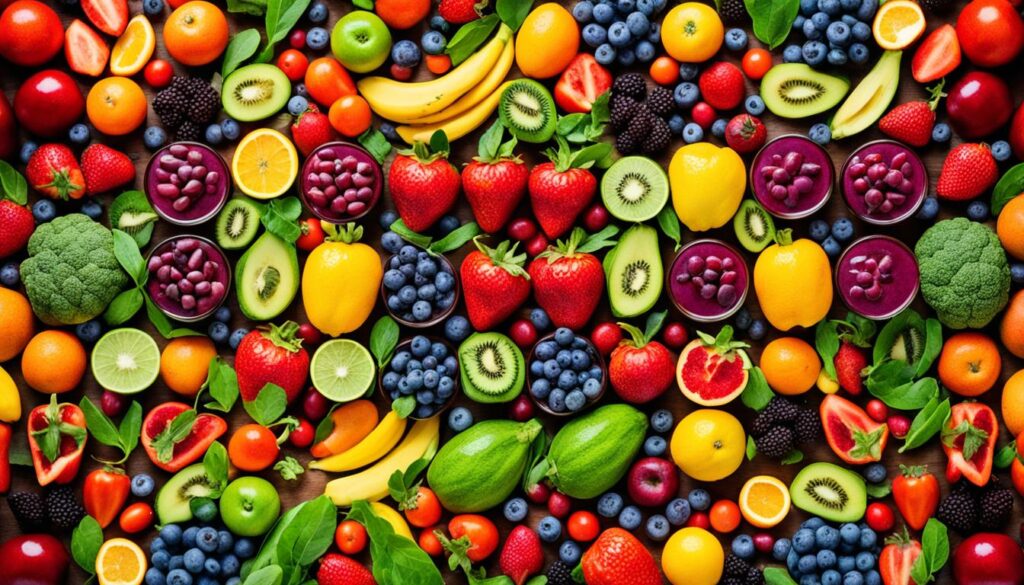
Cocoa is renowned for its high antioxidant content, particularly in the form of polyphenols and flavanols. These antioxidants play a crucial role in combating oxidative stress, which is a major contributor to skin aging and damage. Cocoa’s powerful antioxidants can neutralize harmful free radicals, helping to protect the skin from environmental stressors and promote a healthier, more youthful appearance.
Understanding Oxidative Stress
Oxidative stress is a natural process that occurs when the body’s cells are exposed to an imbalance of free radicals and antioxidants. This imbalance can lead to cellular damage, inflammation, and premature skin aging. By consuming cocoa antioxidants, you can help counteract the effects of oxidative stress, safeguarding your skin’s health and vitality.
Cocoa’s Role in Fighting Free Radicals
The antioxidants found in cocoa, including polyphenols and flavanols, are highly effective at neutralizing free radicals that can harm the skin. These potent compounds work to scavenge and eliminate the reactive oxygen species that contribute to cellular damage, inflammation, and accelerated skin protection. Incorporating cocoa into your diet and skincare routine can provide your skin with a powerful shield against environmental aggressors.
How does cocoa consumption impact skin health?
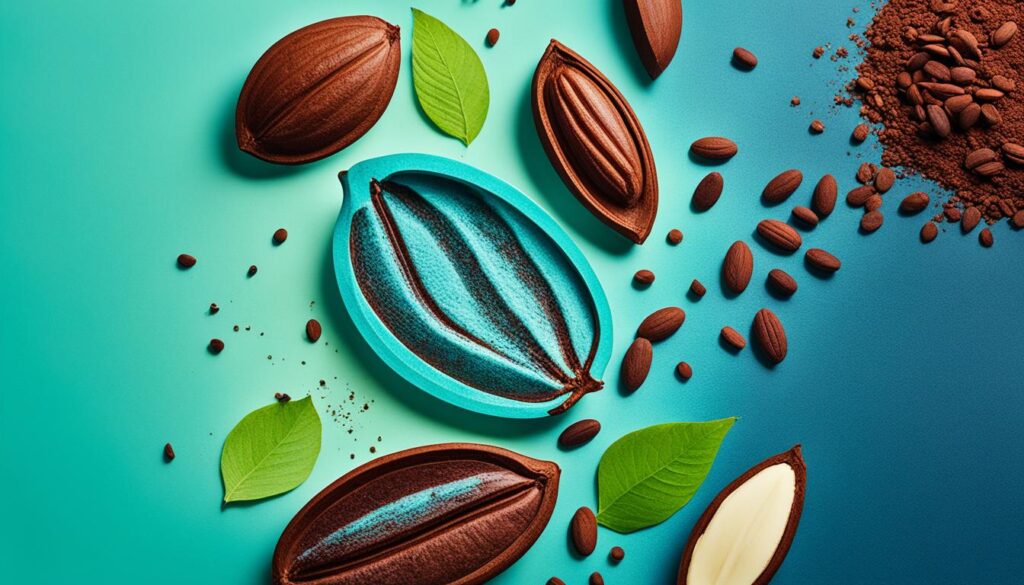
Consuming cocoa can have various positive effects on skin health. The antioxidants in cocoa, such as flavanols and polyphenols, can help reduce inflammation, which is a contributing factor to many skin conditions. By neutralizing harmful free radicals and mitigating oxidative stress, cocoa’s anti-inflammatory properties can promote a healthier, more youthful complexion.
Cocoa’s Anti-Inflammatory Effects
One of the key ways in which cocoa consumption can benefit the skin is through its anti-inflammatory effects. Chronic inflammation is linked to a wide range of skin issues, including acne, eczema, and premature aging. The antioxidants in cocoa can help soothe inflammation, reducing redness, swelling, and irritation, and ultimately contributing to a more radiant, balanced skin appearance.
Protecting Skin from UV Damage
In addition to its anti-inflammatory benefits, cocoa also has the ability to protect the skin from harmful UV radiation. The powerful antioxidants in cocoa can help neutralize free radicals and mitigate the damaging effects of sun exposure, which can lead to premature aging, sunspots, and increased risk of skin cancer. Incorporating cocoa into your diet and skincare routine can provide an extra layer of UV protection for your skin.
Improving Skin Hydration and Elasticity
Cocoa consumption has also been shown to enhance skin hydration and elasticity. The flavanols in cocoa can help improve skin barrier function, locking in moisture and preventing excessive water loss. This can lead to a more supple, youthful-looking complexion with improved skin elasticity. Incorporating cocoa-based products into your skincare routine can further contribute to these beneficial effects.
Cocoa and Skin Aging
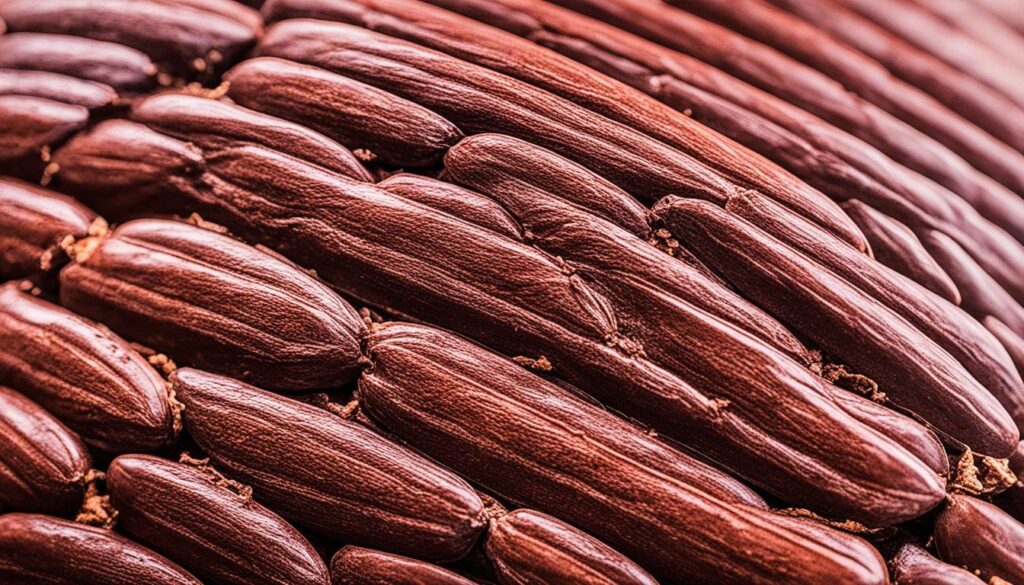
The antioxidants and other beneficial compounds in cocoa can play a crucial role in preventing premature skin aging. By neutralizing free radicals and reducing inflammation, cocoa anti-aging properties may help slow down the development of fine lines and wrinkles, as well as other visible signs of premature skin aging. Incorporating cocoa into your diet and skincare routine can contribute to a more youthful, rejuvenated appearance.
Preventing Premature Skin Aging
The powerful antioxidants found in cocoa, such as flavanols, can combat the damaging effects of oxidative stress on the skin. By scavenging free radicals and mitigating inflammation, these antioxidants may help protect the skin from premature aging, preserving its elasticity and radiance over time.
Reducing Fine Lines and Wrinkles
Regular consumption of cocoa and the use of cocoa-based skincare products have been associated with a reduction in the appearance of fine lines and wrinkles. The nourishing compounds in cocoa can help improve skin hydration, plumpness, and overall texture, leading to a more youthful, rejuvenated complexion.
Cocoa for Skin Conditions

Cocoa’s remarkable properties extend beyond just enhancing overall skin health – it may also offer potential benefits for specific skin conditions. The anti-inflammatory nature of cocoa’s antioxidants can be particularly advantageous in managing certain dermatological issues.
Potential Benefits for Acne
Acne is a common skin condition that often involves inflammation and redness. The antioxidants found in cocoa may help reduce this inflammation, which in turn can alleviate the appearance of acne breakouts. By targeting the underlying inflammatory response, cocoa-based products could potentially be a helpful addition to an acne management routine.
Cocoa and Sensitive Skin
For individuals with sensitive skin, finding skin care products that don’t cause further irritation can be a challenge. Interestingly, cocoa-based formulations may be a suitable option for those with sensitive skin. The natural compounds in cocoa have a soothing and nourishing effect, helping to calm and nourish the skin without triggering additional sensitivity or irritation.
Whether you’re struggling with acne or have a more delicate skin type, incorporating cocoa into your skin care regimen could be a worthwhile consideration. Its anti-inflammatory properties and gentle nature make it a potentially valuable ally in addressing various skin conditions.
Cocoa Products for Skin Care
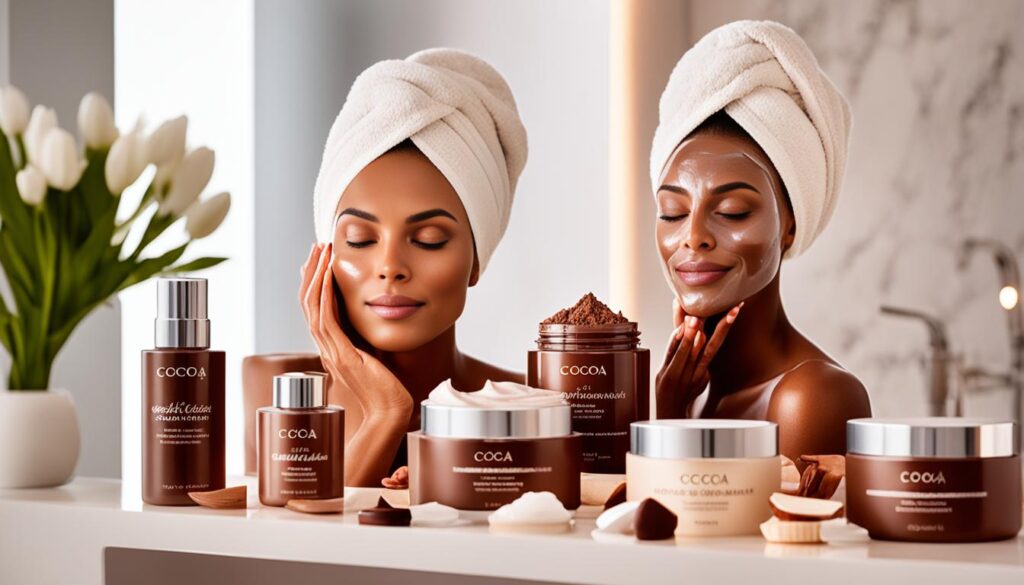
When it comes to incorporating cocoa into your skin care routine, you have the option to explore both topical applications and edible cocoa products. Each approach offers unique benefits to optimize the positive impact on your skin health.
Topical Applications
Topical cocoa-based products, such as creams, lotions, and masks, can directly deliver the beneficial compounds to your skin. These formulations harness the antioxidant properties of cocoa to help protect your skin from environmental stressors, reduce inflammation, and promote a more youthful, radiant complexion. Research has shown that topical applications of cocoa can enhance skin hydration and elasticity, contributing to an overall healthier and smoother appearance.
Edible Cocoa Products
In addition to topical applications, incorporating edible cocoa products into your diet can provide systemic benefits for your skin. Consuming cocoa-rich foods and drinks, such as dark chocolate, cocoa powder, or cocoa nibs, can help nourish your skin from the inside out. The antioxidants and other beneficial compounds in cocoa can work to combat oxidative stress, reduce inflammation, and support overall skin health.
By integrating both topical and edible cocoa into your skin care routine, you can optimize the positive impact on your skin’s appearance and well-being. Explore the diverse range of cocoa skin care products available and find the right combination that suits your individual needs and preferences.
Optimal Cocoa Consumption

To maximize the skin health benefits of cocoa, it’s important to understand the different forms of cocoa and consume it in moderation. Cocoa can be enjoyed in various forms, such as dark chocolate, cocoa powder, and cocoa nibs. These different cocoa forms offer a range of antioxidants, flavanols, and other beneficial compounds that can contribute to improved skin health.
Forms of Cocoa
Dark chocolate, with its higher cocoa content, is often considered the most optimal cocoa consumption for skin health benefits. The antioxidants and flavanols in cocoa can help protect the skin from environmental stressors, reduce inflammation, and promote a more youthful, radiant complexion. Cocoa powder and cocoa nibs are also excellent sources of these beneficial compounds and can be incorporated into various recipes and skincare products.
Moderation is Key
While cocoa is generally considered safe, it’s crucial to consume it in moderation. Overconsumption of cocoa, particularly in the form of high-sugar products like chocolate, can lead to potential side effects, such as weight gain, digestive issues, and caffeine-related concerns. To reap the maximum skin health benefits of cocoa, it’s important to find a balanced approach and enjoy it as part of an overall healthy lifestyle.
Cocoa and Overall Health
While the benefits of cocoa consumption for skin health are well-documented, its impact on overall well-being is equally remarkable. Emerging research suggests that incorporating cocoa into a balanced lifestyle can contribute to cardiovascular health and cognitive benefits, providing a holistic approach to wellness.
Cardiovascular Benefits
Studies have shown that the flavanols found in cocoa can help lower blood pressure and cholesterol levels, which are crucial factors in maintaining a healthy cardiovascular system. For instance, a 2006 study published in the Journal of Agricultural and Food Chemistry found that flavanol-rich foods, such as cocoa, can inhibit angiotensin-converting enzyme (ACE) activity, which is associated with improved blood pressure regulation.
Cognitive Effects
In addition to its cardiovascular benefits, cocoa has also been linked to cognitive improvements. The flavanols in cocoa have been shown to enhance mood, focus, and overall brain function. A study published in the FEBS Letters in 2003 found that flavan-3-ols and procyanidins in cocoa can inhibit ACE activity, which may contribute to these cognitive benefits.
By incorporating cocoa into a balanced diet and lifestyle, individuals can enjoy the holistic wellness benefits of this versatile and nutrient-rich food. From supporting cardiovascular health to enhancing cognitive function, cocoa offers a multifaceted approach to overall well-being.
Potential Side Effects
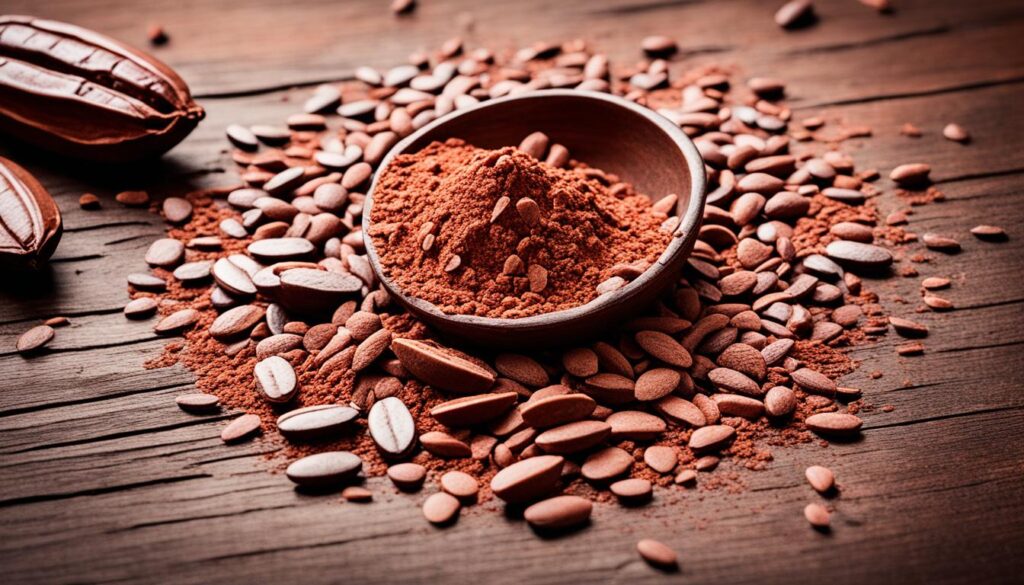
While cocoa is generally considered safe, there are some potential side effects to be aware of. Some individuals may have allergies or intolerances to cocoa, which can lead to adverse reactions. Additionally, overconsumption of cocoa, particularly in the form of high-sugar products like chocolate, can result in issues such as weight gain, digestive problems, and caffeine-related side effects. Moderation is key when incorporating cocoa into your diet and skincare routine.
Allergies and Intolerances
While cocoa is generally well-tolerated, some people may experience allergic or intolerant reactions to the compounds found in cocoa. These reactions can manifest as skin irritation, digestive issues, or even more severe responses. It’s important to be mindful of any individual sensitivities and consult with a healthcare professional if you suspect a cocoa-related allergy or intolerance.
Overconsumption Concerns
Consuming cocoa in moderation is generally safe, but overconsumption can lead to potential problems. High intake of cocoa, particularly in the form of sugary chocolate, can contribute to weight gain, digestive discomfort, and even caffeine-related side effects like increased heart rate or restlessness. It’s crucial to strike a balance and enjoy cocoa-based products as part of a well-rounded, healthy diet.
Incorporating Cocoa into Your Routine
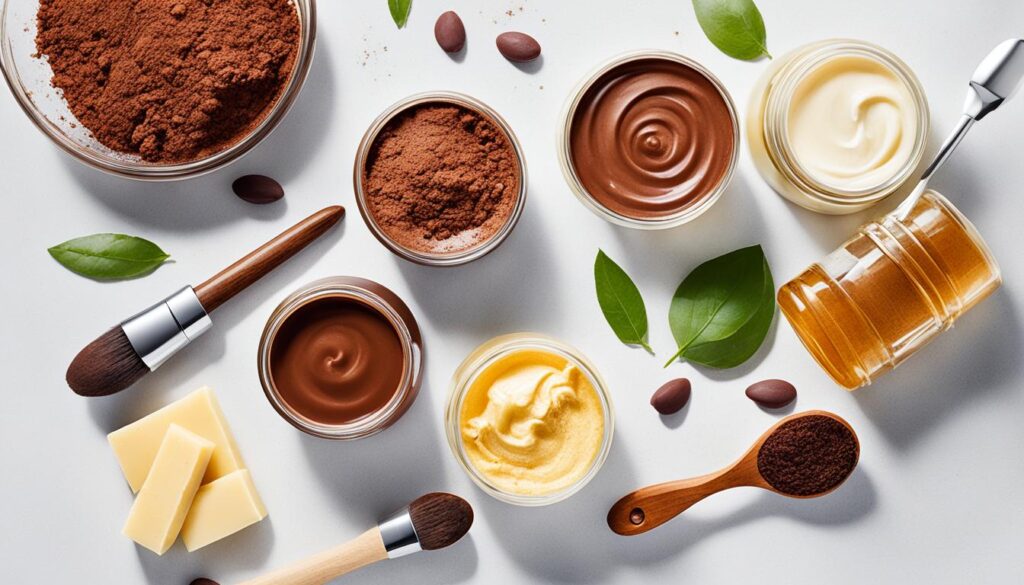
Reaping the skin health benefits of cocoa is easy with a few simple steps. From incorporating cocoa-rich foods and drinks into your diet to using topical cocoa-based products, there are numerous options to explore and integrate into your daily routine.
Recipes and Ideas
Start your day with a nourishing cocoa smoothie, blending cocoa powder, almond milk, and your choice of fruits and superfoods. For a midday pick-me-up, opt for a dark chocolate snack or a warm cup of cocoa-infused tea. When cooking, experiment with cocoa-based recipes, such as roasted vegetables with a cocoa-spice rub or a rich, decadent cocoa-infused chili.
Combining with Other Skincare Practices
To maximize the skin-nourishing benefits of cocoa, pair it with other holistic skin care practices. Apply a cocoa-based face mask before your daily sunscreen to protect against environmental stressors and promote a radiant complexion. Incorporate cocoa-infused body lotions into your post-shower routine to hydrate and nourish your skin. Remember, a comprehensive approach that combines the power of cocoa with other skin-loving ingredients can lead to optimal skin health and a more youthful, rejuvenated appearance.
Conclusion
In conclusion, the consumption of cocoa can have a remarkable impact on skin health. Cocoa’s rich antioxidant content, anti-inflammatory properties, and ability to protect the skin from UV damage make it a valuable addition to a healthy skin care regimen. By incorporating cocoa skin health benefits into your diet and skincare routine, you can enjoy the benefits of smoother, more hydrated, and younger-looking skin.
Remember to consume cocoa in moderation and combine it with other healthy skin care practices for optimal results. The recap of cocoa’s numerous skin-nourishing qualities, from fighting free radicals to improving hydration and elasticity, highlights its potential as a powerful ally in your quest for vibrant, radiant skin.
As you continue your journey towards healthier, more youthful-looking skin, the summary of cocoa’s skin health benefits serves as a valuable guide. Embrace the power of this versatile ingredient and witness the transformative effects it can have on your complexion. With a balanced approach, cocoa can be a remarkable addition to your holistic skin care routine.

Leave a Reply